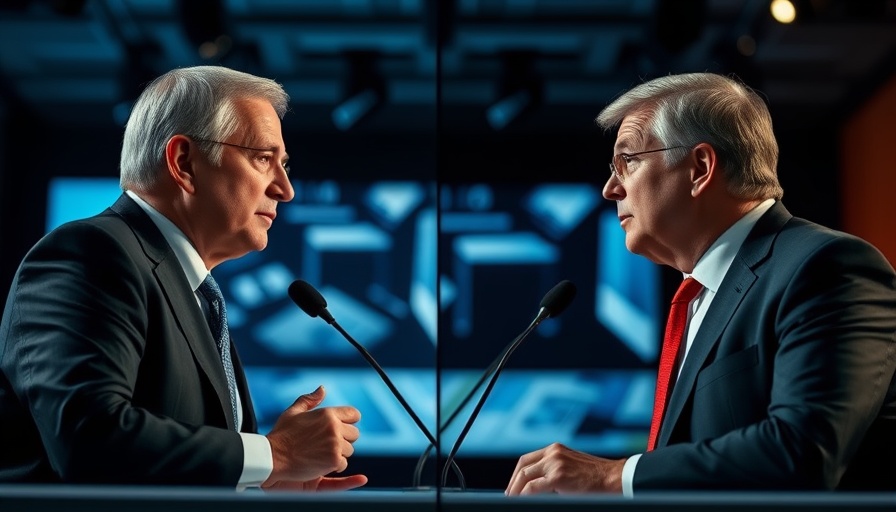
The Imminent Impact of Trump’s Tariff Strategy
Kevin O'Leary, widely known for his appearances on Shark Tank, recently made waves in a spirited interview on Yahoo Finance where he dissected Donald Trump's tariff policy amid rising concerns about a potential recession. For O'Leary, tariffs represent a necessary negotiation tactic rather than a mere economic weapon. In the context of trade relations, specifically with China, he argues that tariffs serve not just as a financial tool, but also as leverage in broader geopolitical discussions, hinting that patience is essential as markets adjust to these new economic realities.
In Kevin O'Leary's insightful discussion, he explores Trump's tariff strategy, which raised compelling points that we’re expanding on in this article.
The Trade Wars: A Complex Web of Interconnected Issues
Tariffs are not simply taxes on imported goods; they are an intricate component of international trade agreements. O'Leary emphasizes that tariffs reflect the reciprocal nature of global trade. When one nation raises its tariffs, another must respond accordingly or face the economic consequences. It's a fine balancing act—get it wrong, and you spiral into a trade war, which is exactly the reality we see with China today.
During the conversation, O'Leary candidly stated that despite the current anxiety in the financial markets, these tariffs could actually provide a framework for solving longstanding trade imbalances. This commentary comes amidst fears that the U.S. economy could be headed for tumultuous times. However, O'Leary confidently pledged that many of these tariffs will be resolutely negotiated down, particularly in the Canadian realm after upcoming elections.
Long-Term Economic Strategy: Understanding the Real Goals
As O'Leary pointed out, understanding the rationale behind these tariffs is critical for both Americans and Canadians alike. Economic diplomacy extends far beyond simple taxation; it's a strategic maneuver aimed at leveling the playing field and securing fairer trade dynamics across borders. The overarching theme of O'Leary's analysis is that these tariffs, viewed skeptically by some, are ultimately designed to empower American workers against what he describes as unfair competition from nations like China.
This brings us back to the domestic implications of Trump's trade policies. According to O'Leary, this isn’t merely about appeasing Wall Street; it’s about serving the very core of the American workforce. The essence of Trump's current administration’s agenda is to lengthen America’s competitive arm by strengthening its economic framework, ultimately prioritizing local workers over globalism.
A Closer Look at Canada: The Hidden Economic Dynamics
O'Leary's insights take on added significance when considering the unique Canadian-American trade relationship. Canada, after all, is one of America's largest trading partners. The potential fallout of these tariffs and how they affect Canadian citizens are crucial aspects that must be understood. Canadians have already displayed discontent by boycotting American products, a move that echoes the increasing sentiment among citizens who are concerned about the adverse economic impacts of political maneuverings.
Interestingly, O'Leary reiterates that while discontent surfaces during election cycles, the long-term economic realities will ultimately outweigh short-term political rhetoric. By focusing on practical economic interests, both sides must comprehend the urgency of continuing negotiations post-election.
The Dividend of Patience: Why Time Is Essential
Perhaps the most resounding takeaway from O'Leary's remarks is the emphasis on patience and realistic assessments. He argues that economic corrections are normal, and this particular downturn must not be blamed solely on tariffs. Instead, he advocates for understanding these tariffs as part of a broader strategic play—one that will necessitate time but is destined to yield results.
As American companies grapple with operational challenges stemming from China's refusal to play by established rules, O'Leary's message pushes towards an acknowledgment of this arduous adjustment period. He believes that conceiving tariffs as negotiations for the broader American workforce, rather than detrimental taxes, can alter public perception significantly.
Conclusion: The Call for Rationality and Future Engagement
In a world where trade negotiations often become mired in political theatrics, O'Leary's compelling arguments present a clear-cut directive for the future: rationality and commitment to economic strategy must prevail. As elections loom and opinions fluctuate, it is imperative that citizens advocate for an informed understanding of how these negotiations shape their economic landscape.
To further engage with these pivotal discussions, consider subscribing to channels that analyze the intricacies of economic policies, both for local and global contexts. With clarity on negotiation tactics and the strategic essentials that underlie these tariff decisions, followers can gain a better grasp of their economic environment and advocate for the perspectives that align with their interests.
 Add Row
Add Row  Add
Add 




 Add Row
Add Row  Add
Add 

Write A Comment